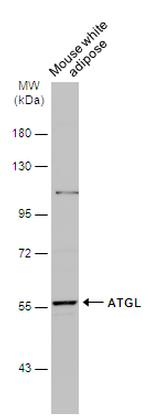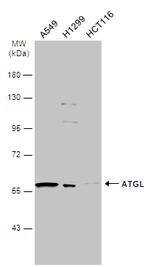Search Thermo Fisher Scientific
FIGURE: 1 / 2
ATGL Antibody (PA5-29064) in WB


Product Details
PA5-29064
Species Reactivity
Host/Isotype
Class
Type
Immunogen
Conjugate
Form
Concentration
Purification
Storage buffer
Contains
Storage conditions
Shipping conditions
RRID
Product Specific Information
Recommended positive controls: A549, H1299, HCT116, mouse white adipose.
Predicted reactivity: Mouse (83%), Rat (83%), Pig (80%), Sheep (85%), Bovine (84%).
Store product as a concentrated solution. Centrifuge briefly prior to opening the vial.
Target Information
Lipolytic enzymes are required for mobilization of fatty acids from triglyceride stores in adipose tissue. Energy homeostasis is affected by dysfunctional lipolysis and may contribute to the pathogenesis of obesity and insulin resistance. Until recently, hormone-sensitive lipase (HSL) was the only enzyme known to hydrolyze triglycerides in mammalian adipose tissue. It is now thought that a second enzyme, adipose triglyceride lipase (ATGL), catalyzes the initial step in triglyceride hydrolysis. ATGL is highly expressed in adipose tissue of mice and humans. It exhibits high substrate specificity for triacylglycerol and is associated with lipid droplets. Inhibition of ATGL markedly decreases total adipose acyl-hydrolase activity. Thus, ATGL and HSL coordinately catabolize stored triglycerides in adipose tissue of mammals.
For Research Use Only. Not for use in diagnostic procedures. Not for resale without express authorization.
References (0)
Bioinformatics
Protein Aliases: Adipose triglyceride lipase; ATGL DESNUTRIN; calcium-independent phospholipase A2; Calcium-independent phospholipase A2-zeta; Desnutrin; DKFZp667M109; IPLA2 zeta; IPLA2-zeta; mutant patatin-like phospholipase domain containing 2; patatin-like phospholipase domain containing 2; patatin-like phospholipase domain containing protein 2; Patatin-like phospholipase domain-containing protein 2; PEDF R; PEDF-R; pigment epithelium-derived factor; Pigment epithelium-derived factor receptor; plpl; plpl2; transport-secretion protein; Transport-secretion protein 2; transport-secretion protein 2.2; triglyceride hydrolase; TTS 2.2; TTS2; TTS2.2
Gene Aliases: 0610039C21Rik; 1110001C14Rik; ATGL; FP17548; iPLA2zeta; PEDF-R; PNPLA2; TTS-2.2; TTS2
UniProt ID: (Human) Q96AD5, (Mouse) Q8BJ56
Entrez Gene ID: (Human) 57104, (Mouse) 66853

Performance Guarantee
If an Invitrogen™ antibody doesn't perform as described on our website or datasheet,we'll replace the product at no cost to you, or provide you with a credit for a future purchase.*
Learn more
We're here to help
Get expert recommendations for common problems or connect directly with an on staff expert for technical assistance related to applications, equipment and general product use.
Contact tech support
